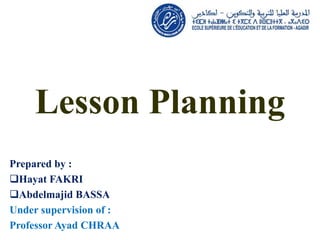
How to plan a Lesson
- 1. Lesson Planning Prepared by : Hayat FAKRI Abdelmajid BASSA Under supervision of : Professor Ayad CHRAA
- 2. Outline What is a lesson plan ? Why do we plan lessons ? Key components of a lesson plan What to consider in writing a lesson plan ? Principles of a lesson plan How to set objectives for a lesson plan ?
- 3. What is a lesson plan ? “Would you tell me, please, which way I ought to go from here?” asked Alice. “That depends a good deal on where you want to get to,” said the Cheshire Cat. -Lewis Carroll, Alice’s Adventures in Wonderland.
- 4. “ The success with which a teacher conducts a lesson is often thought to depend on the effectivness with which the lesson was planned”. - RICHARDS, J. C. 1998.
- 5. A lesson plan is a schedule that tells the teachers what to do in a specific time to specific group of learners about specific lesson. It is also defined as a detailed description of a teacher’s course of instruction for an individual lesson intended to help learners achieve a particular learning objective.
- 6. Why do we plan lessons ? Preparing lesson plans organizes the time of the classroom and helps teachers to achieve their lessons efficiently with the given time. Generally, it can be stated that lessson planning brings advantages to teachers because: It enables them to structure the teaching/learning process. It helps to avoid uncontrolled improvisation and it shows the professionalism of the teachers.
- 7. It helps in keeping a record of the lessons that have been covered inside the classroom. It helps to arouse a sense of control, security and confidence between teachers and students. It contributes to positively regard the use of time and creativity. It helps to stop unnecessary repetition of content. It helps in linking new knowledge to previous knowledge.
- 8. Key components of a lesson plan: GOALS : An overall purpose or the goal that you will attempt to achieve by the end of the class period. OBJECTIVES : The objectives must clearly and accurately express what the learners will be able to do by the end of the lesson. Each lesson should have learning objectives that can be described as SMART: specific, measurable, achievable, results focused, and time bound.
- 9. MATERIALS & EQUIPMENTS : Good planning includes knowing what you need to take with you or to arrange to have in your classroom.The instructional materials and aids needed may include: pictures, a projector, handouts, a tape recorder, posters.. Making sure to obtain a necessary materials before class is important as it saves time and helps teachers feel more prepared.
- 10. PROCEDURES: Procedures are teaching ways and techniques that teachers make use of to perform certain activities. These include: • A warm up • A set of activities and techniques in which you have considered appropriate proportions of time for: whole class work, group or pair work, teacher talk, student talk.
- 11. EVALUATION: The evaluation is to assess students’ learning and whether or not the learning objectives were met. EXTRA-CLASS WORK : An extention of classroom ctivity that will help students do some learning beyond class hour.
- 12. What to consider in writing a lesson plan ? PREREQUISITE : Know who your students are. Know their ability levels, backgrounds and interests. Attention spans Ability to work together in groups Prior knowledge and learning experiences Special needs or accommodations Learning preferences.
- 13. KNOW YOUR CONTENT : It is important for you to research the subject matter that you will be teaching. School district curriculm guides. National curriculum standards.
- 14. KNOW THE INSTRUCTIONAL MATERIALS : Technology, Software, Audio/visuals, Teacher mentors, Community resources, Equipment, Library resources, local guest speakers, volunteers, or any materials that can assist you in teaching.
- 15. CLEAR GOAL/OBJECTIVE : It is important to set clear goals and objectives for your lesson plan to ensure that you stay on topic and cover the relevant information.
- 16. ANTICIPATE CHALLENGES : Adaptions for students needing extra help and additions for students needing an extra challenge.
- 17. MAKE IT RELEVENT : Be sure to include some sort of real world application in your lesson. This will help your students grasp otherwise complicated topics with much more ease. Additionally, look for ways in which you can connect your lesson to previous lessons and can grow upon those.
- 18. LESSON ASSESSMENT : Tests, quizzes, group projects, oral presentations.
- 19. Principles of a lesson plan: AIMS : consider realistic goals for the lesson, not too easy but not too difficult. VARIETY : Why vary ? What to vary ? COHERENCE : • Observe a logical pattern to the lesson. • Smooth transiton. • An activity in a lesson builds on the previous one and preparesfor the next one.
- 20. FLEXIBILITY • It is useful when planning to build in some extra and alternative tasks andexercises. • Ability to use a number of diffrent techniques and not be aslave to one methodology. BALANCE : The lesson is a mixture of a number of ingredients, a successful teacher is the one who is able to observe the right dosage and makes the learners enjoy a savory lesson.
- 21. How to set objectives for a lesson plan ? What will students accomplish during this lesson ? To what specefic level (i.e. 75% accuracy) will the students perform a given task in order for the lesson to be considered satisfactorily accomplished ?
- 22. Exactly how will the students show that they understood and learned the goals of your lesson ? Will this occur through a worksheet, group work, presentation, illustration, etc ? Additionally, you will want to make sure that the lesson’s objective fits in with your district educational standards for your grade level.
- 23. THANK YOU !